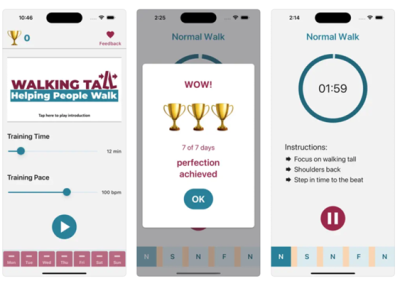A group of Australian researchers from the University of New South Wales (UNSW) in Sydney has stepped up to develop an app that aims to retrain and improve the action of walking in people with Parkinson’s disease.
The app, dubbed Walking Tall, gives users audio guidance and encouragement to help smooth out their gait, since Parkinson’s can impede the brain cells responsible for movement, often resulting in much slower and smaller movements than normal.
After users have set their desired training time and pace in the app, it provides a consistent metronome beat to help them match the preset pace. Throughout the training session, the app keeps up an audio commentary to encourage users, and the Walking Tall platform also offers written reminders to “focus on big steps” and keep the chin high and shoulders back. As they complete certain training milestones, users can earn virtual trophies.
The researchers—led by Matthew Brodie, Ph.D., a senior lecturer in biomedical engineering at UNSW—developed the technology in collaboration with people with Parkinson’s, according to a university release this week.
“Those who live with Parkinson’s disease have to think about every single step they take. We asked them how much mental effort it takes for them to walk, and often they would say 100%,” Brodie said in the release. “With the metronome beat of the app, the aim is to replace the need to think about walking and help with the timing of their steps.”

He added, “This app can give people confidence and also a sense of achievement that they can be empowered and do something for themselves to help their own condition.”
Brodie and his team also claim the app is a particularly efficient training tool—with training sessions lasting as little as six minutes a day only every other day still making an impact.
“What we have found is that once people become engaged, and they find they are getting the benefits, then they actually want to do more,” Brodie said.
“All they have to do is tap one button on their smartphone, and they can start exercising, even just up and down the corridor in their home,” he continued. “For someone with Parkinson’s disease whose goal might only be to have the ability to walk to their letterbox every day, that can really help them.”
The Walking Tall app was recently put through its paces in a clinical trial that was funded by the Michael J. Fox Foundation for Parkinson’s Research and the Shake It Up Australia Foundation. It assigned a group of 62 Parkinson’s patients to use either the Walking Tall app or the widely used Otago Exercise Program (OEP)—comprising a series of strength and balance exercises—for about three months.
Full results have yet to be published, but, according to this week’s release, after the 13-week study period, the Walking Tall users were using the training program for an average of 150 minutes per week, compared to just an hour per week for the OEP group.
Though the trial results are still under review, Brodie has already formed a UNSW spinout company called Walking Tall Health devoted to the app’s development. The researchers have also continued to improve the software, including by enhancing the preset training sessions to guide users through a variety of walking speeds.
They’ll continue to develop the app based on feedback from real-world users, according to Martin Ostrowski, Ph.D., who is Walking Tall Health’s chief science officer and has Parkinson’s himself.
“It’s all about listening to what people need and keeping it simple and building trust,” Ostrowski said in the release. “I have used the app myself, and it is so easy. It gives me that beat that means I am able to walk without using all of that mental effort. People without Parkinson’s might not realize because that just comes naturally to them.”
He added, “Michael J. Fox has said Parkinson’s is the gift that keeps on taking. But I think an app like this empowers people living with Parkinson’s to have some control over helping themselves and realizing they can still have a long and productive life.”